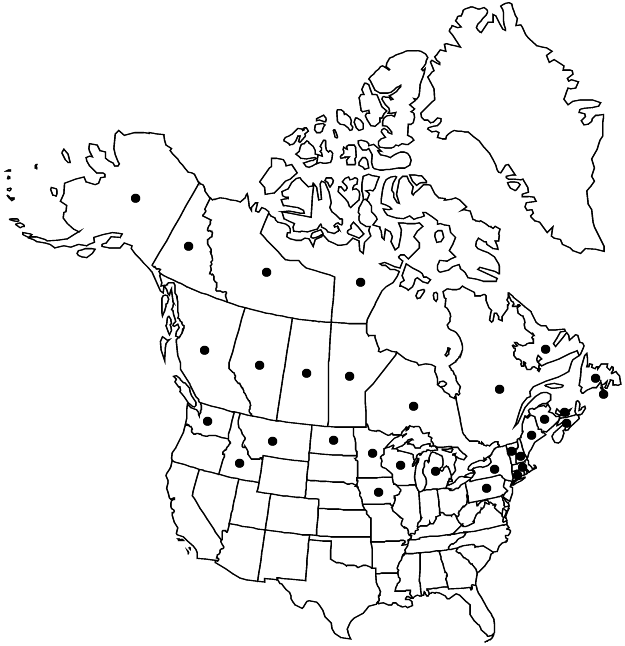Mitella nuda
Sp. Pl. 1: 406. 1753· Naked mitrewort, mitrelle nue,.
Plants usually stoloniferous. Flowering-stems (2–) 6–20 (–25) cm. Leaves: petiole 1.2–8 (–10) cm, short-stipitate-glandular, longer hairs usually retrorse, sometimes spreading, white; blade cordate to reniform, ± as long as wide, (0.4–) 1.1–4.7 (–8) × (0.4–) 1.2–4.8 (–7.5) cm, margins unlobed or shallowly 3-lobed, singly crenate, irregularly ciliate, apex of terminal lobe obtuse to rounded, surfaces sparsely glandular-puberulent and glandular-hirsute; cauline leaves absent or 1, proximal, sessile or subsessile, blade 0.4–1.6 (–2.8) × 0.8–2.6 cm. Inflorescences 1–3 (–6), remotely (1–) 2–15-flowered, 1 flower per node, not secund, long-stipitate-glandular proximally, short-stipitate-glandular distally. Pedicels 1–6 mm, short-stipitate-glandular. Flowers: hypanthium broadly campanulate, 1.5–2.5 × 2.5–3.5 mm; sepals spreading or recurved, greenish white, ovate to triangular-ovate, 1.5–2.4 × 1–1.8 mm; petals greenish yellow or greenish white, 9–11-lobed, (2–) 3.5–5 mm, lobes linear, lateral lobes spreading; stamens 10, opposite and alternate with sepals; filaments white or greenish white, 0.3–0.5 mm; anthers 0.2–0.3 × 0.2–0.3 mm; ovary 1/3–1/2 inferior; styles erect or spreading, cylindric, 0.4–0.6 mm; stigmas unlobed. Seeds dark reddish-brown or blackish, 0.8–1.2 mm, nearly smooth. 2n = 14, 28.
Phenology: Flowering May–Aug.
Habitat: Moist to wet woods, damp coniferous woods, northern hardwood forests, thickets, swamps, stream banks, bogs
Elevation: 0-3500 m
Distribution

St. Pierre and Miquelon, Alta., B.C., Man., N.B., Nfld. and Labr., N.W.T., N.S., Nunavut, Ont., P.E.I., Que., Sask., Yukon, Alaska, Conn., Idaho, Iowa, Maine, Mass., Mich., Minn., Mont., N.H., N.Y., N.Dak., Pa., Vt., Wash., Wis., e Asia
Discussion
D. E. Moerman (1998) reported that the Cree Indians of Saskatchewan used the crushed leaves of Mitella nuda to treat earaches.
Selected References
None.
Lower Taxa
"full" is not a number.